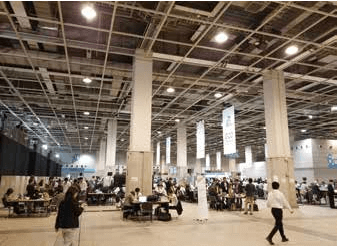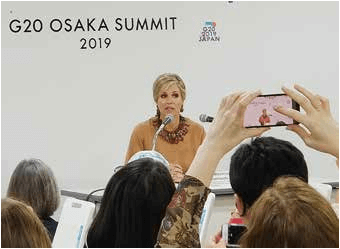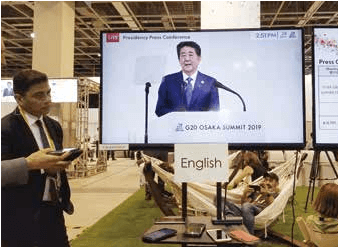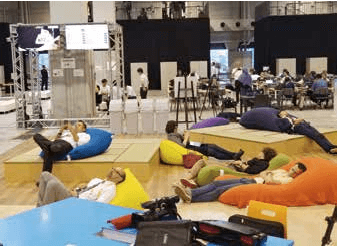Issue:
Cosmetic enhancement at the G20 Summit
The events at summits are calculated to draw press and public attention to important global issues. But after the hoopla of the staged activities, does anything really change?

By Sonja Blaschke
It was the morning of June 29, the second day of the G20 Summit in Osaka. The kickoff event was to be a “special panel” on women’s empowerment, and by the scheduled starting time, a group of journalists had gathered in front of one of the TV screens in the exhibition hall like international media area at the G20 Summit in Osaka. We put our recording devices and phones on a shelf below the TV . . . and then we waited.
Two or three days before the summit, the event had been changed from a “side event” to a “special event.” One can only wonder what prompted this cosmetic, but revealing name change. Only a quarter of an hour had been allocated for three speeches about women’s empowerment by G20 host Prime Minister Shinzo Abe, senior White House adviser (and more importantly, the US president’s daughter) Ivanka Trump, and special guest Queen Máxima of the Netherlands. If that weren’t enough, those same 15 minutes were to include recommendations to Abe from representatives of female empowerment organizations.
And we waited some more, while the participants in the eventleaders from G20 nations and several guests happily chatted away before getting down to business. Surprisingly, in Japan, where punctuality is valued like few other traits, the kickoff event of the day started about 30 minutes late.
The attention the participants garnered could not gloss over the fact that the whole affair felt cosmetic anyway. Its purpose was to make Japan look like a modern nation, when in fact, when it comes to women’s rights, the country trails far behind other industrialized nations and the majority of Asian nations. While Prime Minister Abe’s Womenomics initiative continues to be lauded and has, to some degree, drawn awareness to the topic in Japan, its effect has been limited. In the Global Gender Gap Index of the Swiss based World Economic Forum (WEF) think tank, Japan was only ranked 110th among 149 nations in 2018 worse than some years prior to the Womenomics program. The dismal ranking is, to a large degree, due to the dire lack of women in politics, including in Abe’s Liberal Democratic Party.

The optics weren’t helped by the fact that only two of the Group of 20 leaders on stage were women: outgoing British Prime Minister Theresa May and German Chancellor Angela Merkel. The discrepancy between being supposedly serious about empowering women and the reality of women being discriminated against overtly and covertly was compounded by Ivanka Trump’s speech.
After a few introductory remarks, Trump quickly went on to praise the policies of her father, who was sitting close by. She neglected to mention the numerous accusations of sexual misconduct against him and his repeated misogynist acts. In the end, at an event that was supposed to be about women’s empowerment, she made it all about a man.
The only participant who used the event to discuss specific suggestions for women’s empowerment was Queen Máxima. “If women had an identical role in labour markets as men,” she said, “up to $28 trillion dollars could be added to the global GDP by 2025.” She spoke of three steps needed to achieve that: bridging the digital divide, removing legal and regulatory barriers that obstruct women’s financial inclusion and economic empowerment, and ensuring that women also enjoy access to public goods, including connectivity, cybersecurity, digital ID, financial literacy, digital literacy and data privacy. She also commended German Chancellor Merkel, whose initiative it was to put women on the G20 agenda in the first place.
Unlike the other speakers, she even took time to attend a briefing with journalists in the media center.
MIND YOUR OWN PLASTIC BUSINESS
The women’s empowerment event was not the only cosmetic item of the summit agenda. Another “side” sorry, “special” event concerned the pollution of the oceans with plastic. In order to demonstrate Japan’s commitment to recycling, trash cans had been set up in the venue, with English explanations of how the recycled materials would be used. A nice idea, although it didn’t seem to leave much of a lasting impression on the attendees. A much better idea was to provide attending journalists with a goodie bag which contained a thermos bottle very useful, in particular, because in the preparation materials we were asked to bring our own bottles and plates.

JAPAN SEEMED INTERESTED IN GIVING ITSELF A FACELIFT AND IMAGE BOOST VIA THE SUMMIT. WHETHER THAT REALLY WORKED IS A DIFFERENT QUESTION.
Sadly, there was little incentive to use your own. Glasses and plates were provided in the buffet, paper cups and plates were provided in the snack area, and cans of tea, juice and coffee were everywhere. The absence of plastic cutlery and cups was surely cosmetic and hard to ignore, given how plastic is so ubiquitous in daily life in Japan.
As G20 host, Japan had announced it would be spearheading international efforts to reduce plastic waste. In theory, a laudable action, especially since Japan is the second biggest producer of single-use plastic in the world with 5.87 million tons in 2018 (the US is the first). According to the Ministry of the Environment, 60 percent of the plastic thrown away in Japan is incinerated for energy, only 25 percent is recycled.
In the press conference at the summit’s close, one female journalist from Asia asked Abe quite poignantly whether, instead of exporting recycling technologies and measures to curb the use of plastics in other countries, it would not be better to start in Japan first, considering the pervasive use of plastic and the high plastic production volume. Clearly embarrassed, he circled around to again tout Japan’s efforts abroad.

The only participant with a “personal” take on antiwaste initiative was Russian President Vladimir Putin, who was spotted using his own thermos cup at the formal dinner banquet. While officials claimed it was due to his fondness for tea, the internet was abuzz with wilder theories, like his fear of being poisoned.
FOOD FOR THOUGHT
Cosmetic solutions were also present in the press area. One of the first things I heard from my Japanese journalist col leagues was how great the food was. But eating out in Japan is always a challenge for me, since I suffer from several allergies and intolerances. The situation has been improving in the last two or three years. More and more places, including the catering company at the summit, now indicate allergens in food containing wheat, milk and so on.
Unfortunately, they don’t always offer options if you cannot eat, for example, wheat. While there were several options for dinner (yeah!), the only dishes at lunch that did not contain wheat were green salad and white rice, not a good base for sustenance during a stressful summit schedule. For vegetarians and vegans increasingly popular food trends it must have also been a bit of a challenge.
All in all, G20 host Japan seemed very interested in giving itself a facelift and image boost via the summit. Whether that really worked is a different question. It reminds me of the several large Japanese convenience store chains who decided to ban porn magazines from their shelves in the lead up to the Olympics, so as not to shock the sensibilities of foreign visitors. But no amount of make up can conceal the reality that Japan has one of the biggest sex markets in Asia.
Sonja Blaschke is East Asia & Australasia correspondent for print media in Germany, Austria and Switzerland and a producer for German and Swiss television.

